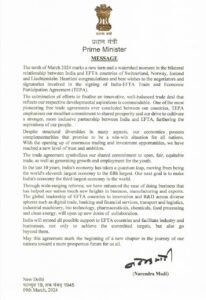The Trade and Economic Partnership Agreement (TEPA) between India and the European Free Trade Association (EFTA) on Sunday, marks a significant milestone in global trade dynamics, particularly within the luxury goods sector. The concessions offered by India, including the reduction of tariffs on Swiss watches and chocolates, carry far-reaching economic implications.
By lowering the cost of these high-end products, Indian consumers are poised to experience tangible benefits, potentially spurring increased demand and consumption. This, in turn, could contribute to economic growth by stimulating both domestic and international trade.
The phased reduction of duties over a seven-year period reflects a deliberate strategy aimed at fostering sustainable trade relationships and enhancing competitiveness in the global marketplace.
By gradually eliminating tariffs, India aims to create a level playing field for domestic and international producers while incentivizing innovation and investment in key industries. Moreover, the duty concession serves as a testament to India’s commitment to liberalizing trade and embracing a more open and inclusive economic framework.
Bilateral Trade Relations: India-EFTA Dynamics
 The TEPA negotiations underscore the importance of bilateral trade relations between India and the four EFTA member states—Switzerland, Norway, Liechtenstein, and Iceland. Switzerland, in particular, emerges as a pivotal trading partner, accounting for the largest share of bilateral trade with India.
The TEPA negotiations underscore the importance of bilateral trade relations between India and the four EFTA member states—Switzerland, Norway, Liechtenstein, and Iceland. Switzerland, in particular, emerges as a pivotal trading partner, accounting for the largest share of bilateral trade with India.
However, the trade volume of $18.66 billion in 2022-23 reflects the robust nature of India’s trade relations with all EFTA nations, highlighting the diverse opportunities for collaboration and exchange.
Through TEPA, both India and EFTA member states seek to deepen their economic ties and capitalize on each other’s strengths. By leveraging comparative advantages in various sectors, including pharmaceuticals, chemicals, and gemstones, India aims to expand its market access and enhance export competitiveness.
Similarly, EFTA member states stand to benefit from increased access to India’s vast consumer market and emerging industries, fostering mutual prosperity and sustainable development.
Impact on Swiss products
 The Swiss products are synonymous with precision, quality, and luxury. From world-famous Swiss watches crafted with meticulous attention to detail to delectable chocolates renowned for their rich flavors, Switzerland sets the standard for excellence.
The Swiss products are synonymous with precision, quality, and luxury. From world-famous Swiss watches crafted with meticulous attention to detail to delectable chocolates renowned for their rich flavors, Switzerland sets the standard for excellence.
Additionally, Swiss machinery and technology are highly sought after worldwide for their reliability and innovation.
Whether it’s indulging in exquisite treats or investing in top-tier engineering, Swiss products offer unmatched craftsmanship and performance. With a reputation built on centuries of tradition and expertise, Swiss goods continue to captivate global consumers with their unrivaled sophistication and refinement.
TEPA’s tariff concessions extend beyond luxury goods, encompassing a wide range of sectors, including machinery, medical devices, and processed agricultural products.
The elimination of duties on Swiss machinery and medical devices upon the agreement’s enactment holds significant implications for India’s manufacturing sector, facilitating access to advanced technologies and promoting industrial growth.
Additionally, the inclusion of tariff concessions on processed agricultural products underscores the shared commitment to promoting agricultural trade and addressing food security concerns.
Furthermore, TEPA provides a framework for enhancing market access and addressing non-tariff barriers to trade, thereby facilitating smoother cross-border transactions and promoting a more conducive business environment.
By streamlining customs procedures and regulatory requirements, TEPA aims to reduce transaction costs and facilitate the flow of goods and services between India and EFTA member states. This, in turn, is expected to stimulate investment and foster innovation, driving economic growth and creating new opportunities for businesses on both sides.
Strategic Considerations and Future Prospects
As TEPA undergoes the ratification process and moves towards implementation, strategic considerations and future prospects come into sharper focus. The exclusion of sensitive sectors such as dairy, coal, and certain agricultural products underscores the nuanced approach taken by both India and EFTA member states to balance the interests of domestic industries with the imperatives of trade liberalization.
This pragmatic approach reflects a commitment to fostering sustainable and inclusive economic growth while safeguarding vital sectors of the economy.
 Looking ahead, TEPA sets a precedent for future trade agreements and underscores the importance of open, transparent, and rules-based trade relations.
Looking ahead, TEPA sets a precedent for future trade agreements and underscores the importance of open, transparent, and rules-based trade relations.
By promoting dialogue and cooperation between India and EFTA member states, TEPA lays the groundwork for deeper economic integration and enhanced regional cooperation.
Moreover, by addressing key challenges and opportunities in areas such as market access, investment protection, and intellectual property rights, TEPA paves the way for a more prosperous and interconnected future for all parties involved.
ALSO READ: Bitcoin achieves record-breaking high, exceeding the $70,000 threshold











Comments 1